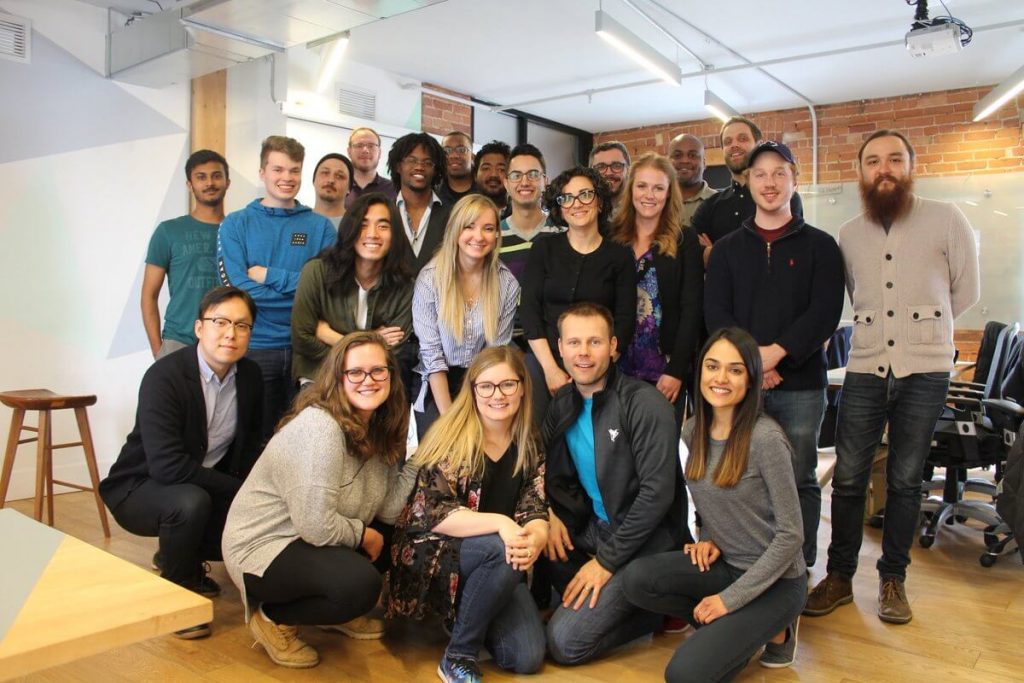Academic admissions fraud has been in the spotlight after federal prosecutors in the US indicted 50 people for allegedly bribing college sports coaches, test proctors, and other individuals to help get their children admitted to elite American universities.
“Once we started looking into [fraud], it was like Pandora’s Box. We realized it was a huge industry.”
The brazen methods wealthy parents, celebrities, and business leaders have used to pay the way for their children to get into ‘the best schools money can buy’ has been shocking, but the news came as no surprise at all to Toronto’s Kira Talent, a cloud-based admissions solution startup that has been trying to bring a spotlight to admission fraud for years.
Kira Talent was founded in 2012 by Emilie Cushman and Konrad Listwan-Ciesielski, who originally thought the company’s timed video and written assessments platform would be a good fit for human resources. Both recent university graduates, the two quickly realized their solution could help tackle a larger problem, “one-dimensional higher education admissions processes.”
Kira quickly pivoted to working with post-secondary institutions to help bolster their admissions. However, the company soon came across an even bigger problem: admissions fraud.

An integral part of Kira’s platform is what the company calls its Integrity Summary, a built-in, backend tool making it difficult for applicants to plagiarize or cheat. Cushman told BetaKit that after working with post-secondary institutions for almost three years it found schools were quite interested in this feature and how it helped limit fraud, so the company decided to lean into that.
“Hearing the needs and the issues of schools, I think we just said, you know what, it sounds like fraud is kind of a concern and we knew for a fact that it was specifically on the admissions essay,” Cushman said. “Once we started looking into that, it was like Pandora’s Box. We…realized it was a huge industry.”
Kira discovered a billion dollar, global industry behind admissions fraud from individual consultants to consulting companies promising to help get students into schools. Based on these initial findings, the startup decided to conduct extensive research. Kira conducted surveys with large post-secondary institutions and in 2015 even hired what Cushman called a “back market admissions company” and put together an application to test out the Canadian admissions system, as well as, the quality of these “black market” applications.
RELATED: Kira Talent raises $5 million Series A to develop talent assessment platform
“We’ve conducted the biggest research initiative in history on the topic,” stated Molly McCracken, Kira’s marketing manager in a 2016 blog post about the study. The company reached out to 50 business schools, admissions directors, and applicants, and found that 84 percent of admissions professionals agree that plagiarism in admissions application components, like essays, personal statements, or resumes is a real problem.
“There’s a large group of applicants who will commit admissions fraud in some way, shape, or form.”
Canada’s admissions system operates quite differently from the US, which requires SATs and further written, supplementary application components. And while systems vary from country to country, there is still a large global industry of admissions consulting firms that promise to help maximize an applicant’s probability of getting accepted into post-secondary institutions.
This isn’t necessarily illegal. One can easily search online for firms that offer mentorship, advice, and prep to help students get into undergraduate, graduate, and professional school programs.
Kira’s 2016 blog post pointed to a Poets & Quants (a news outlet focusing on business schools) study that found as many as 80 percent of the international applicants, and 30 to 50 percent of domestic applicants, to the top US schools use admission consultants.
Fraud comes into play when consultation turns into firms writing essays and completing applications, pretending they came from the student. This is what is alleged to have happened in the recent US scandal, which Time magazine called “the largest college admissions scheme the [US] Department of Justice has ever prosecuted.” The owner of a for-profit college preparation and counseling program, The Edge College & Career Network, is alleged to have been using the company as a way to facilitate bribes between parents and college officials.
While there is more to the US admissions fraud story, and it happened on a much larger scale, Kira had a similar experience when it reached out to a black market admissions consultant in Canada to see if it would help write an admissions essay for an MBA program. Kira was able to easily have an essay written for just $160 dollars.
“There’s a large group of applicants who will commit admissions fraud in some way, shape, or form, whether it is small as getting someone else to write your admissions essay or as large as what you’re seeing in the news,” Cushman noted.
Universities in denial
Based on its findings that more than two-thirds of schools see plagiarism as a problem, Kira decided to shift its entire marketing strategy to position its software as a solution for preventing something that was clearly plaguing post-secondary institutions: fraudulent applications.
“We changed all of our marketing and branding around fraud and preventing it and everything,” Cushman explained, noting that having done all this research, the company was ready to make a “really big splash” in the industry.
However, things didn’t go as planned. “There was no appetite for it. It was falling on deaf ears,” Cushman stated.

She explained that schools fell into two camps, those that knew fraud was there and didn’t know what to do about it, and schools that were in complete denial. The schools that acknowledged the issue apparently told Kira, “stop telling us what we already know…we don’t know how to fix it,” and those denying it just didn’t see it as a problem affecting their institution.
Ironically, of those admissions professionals surveyed by Kira, 88 percent said they believe application fraud could be a problem at other schools, with only half admitting that it could happen to them.
As a result, Kira decided to tone down its marketing focus on fraud.
“We said okay, you know what, clearly fraud is not something that they want to talk about,” Cushman stated. “So we totally shifted all of our marketing and efforts around ‘reducing bias,’ because that seems to be a softer topic that’s not as menacing.”
But the Toronto company didn’t just forget about fraud, it continued to develop its software to include fraud features and continued to see uptake and interest in the feature from schools.
“[Now] it’s all about non-cognitive bias, knowing when to identify it, being aware, and all these things. And that was a big hit,” Cushman stated.
RELATED: Kira Talent acquires LikeLive, adding 40 schools to its client base
Kira’s platform offers timed video and written assessments that applicants gave to conduct as part of supplementary applications. It touts itself as a “holistic admissions solution for higher education.” It works with more than 300 programs, mainly graduate level (80 percent of customers are graduate programs), to build application programs that are fair to both the schools and students applying. In the US, its customers include John Hopkins, Northwestern University, and Boston University; in Canada, it works with a number of institutions including, the University of Toronto, McMaster University, and the University of Waterloo.
“It’s a huge problem and it’s something that you just can’t sweep under the rug.”
While Cushman noted the distinct differences between the Canadian and US undergraduate admission process, she stated that graduate-level programs all typically require essays or other supplementary applications, which open up schools to the possibility for fraud.
When asked about how she felt about the US admissions scandal bringing these issues to light, she noted that Kira was thrilled.
“Now that this massive admission scandal has erupted all around fraud, it seems to be a hot topic again,” stated Cushman. “Because honestly, it’s a huge problem and it’s something that you just can’t sweep under the rug.”
Kira argues that its software can help with much more than bias, and has been built to prevent fraudulent admission applications, whether it’s at the level of the US scandal, or as simple as a fake or plagiarised essay. “Fraud is one of the major issues we strive to tackle at Kira Talent,” the company stated in a blog post.
“We’re seeing this huge flash because there were obviously Hollywood celebrities involved, but this isn’t new. This has been going on for years and years, but it’s just that in the past nobody really want to talk about it. And I think now that it’s gotten so bad, and the cases are so extreme, that now we’re talking about it again, it’s great,” Cushman said.
Feature image courtesy Unspalsh
Images courtesy Kira Talent


